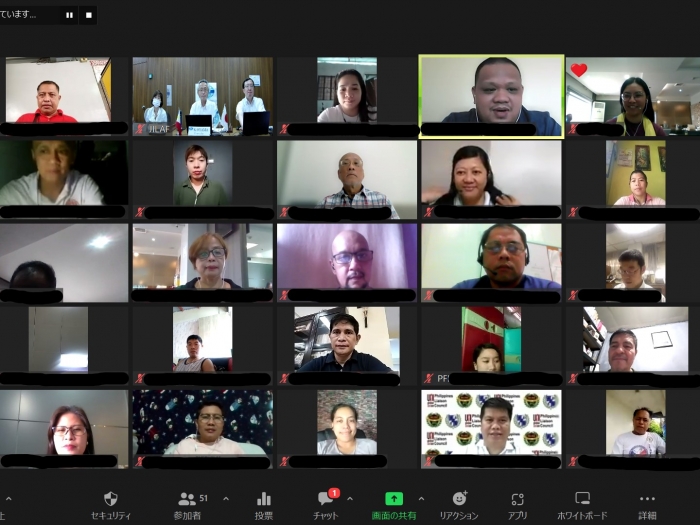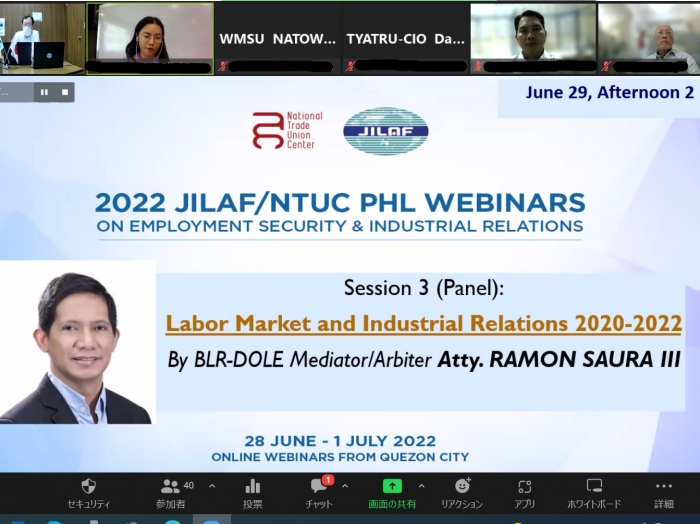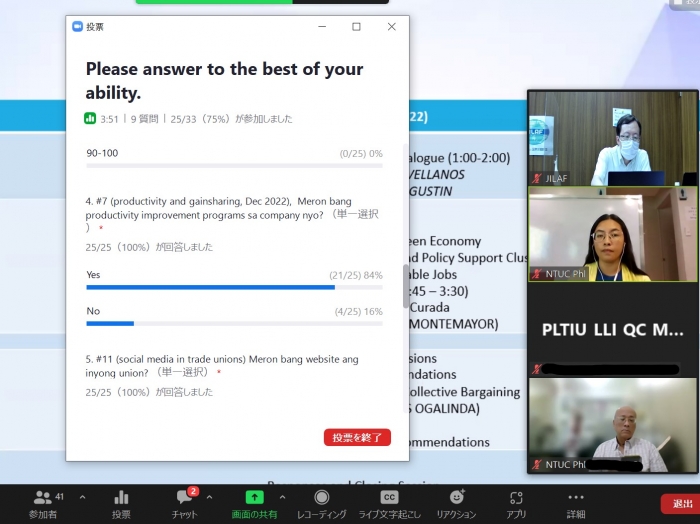NTUC Phl/JILAF Seminar on Industrial Relations (IR) and Labor Policy for the Philippines
From June 28 to July 1 and from July 5 to July 8, a Seminar on Industrial Relations (IR) and Labor Policy was held online in collaboration with NTUC Phl. A total of 85 people participated in this seminar.
At the beginning of the seminar, the NTUC Phl Youth Representative, JILAF Councilor Oyama, and First Secretary Kanno of the Embassy of Japan in the Philippines delivered opening remarks and shared the purpose and objectives of the seminar with all participants.
Following this, Councilor Oyama gave presentations on “Industrial Relations and Employment Security in Japan during the COVID-19 Pandemic,” in which he generally explained matters such as, (1) the history of the Japanese labor movement, (2) the structure of Japanese trade unions, (3) the productivity movement and the three guiding principles of productivity, (4) the spring labor offensive and the labor-management consultation system, (5) efforts to stabilize employment during the COVID-19 pandemic, and (6) the role of the Labor Policy Council.
In response, participants asked about a variety of matters including how the gender gap is dealt with in Japan, the adequacy of Japan’s minimum wage level, and what trade unions should do in today’s climate of global inflation, to which Councilor Oyama answered as appropriate.
Next, Cedric Bugtas, the NTUC Phl Honorary Secretary General, spoke about the recent economic and labor situation in the Philippines by stating, “While some economic indicators, such as the GDP and number of workers, have surpassed pre-pandemic levels, there is still a certain number of workers who have not been able to return to work after taking a leave of absence due to the pandemic. Along with this, minimum wage is also far from being at a livable level.” Continuing on, Bugtas then expressed his opinion, stating, “As a trade union group, we need to focus on activities such as stimulating collective bargaining, stimulating the signing of labor agreements, and raising the minimum wage to a level that allows for a basic standard of living, while pushing forth the organization of trade unions.”
Multiple speakers from the Department of Labor and Employment (DOLE) also participated and each reported on topics such as the most recent (1) state of the labor market and industrial relations, (2) trends and challenges in industrial relations, (3) state of health and safety in the workplace, (4) challenges in transitioning to formal employment, and (5) transition to green and sustainable work. Notably, regarding topic (3), one of the speakers made an appeal, stating, “The rate of compliance with health and safety standards in the workplace is on a declining trend due to the COVID-19 pandemic, and the main causes for violations of these standards are many basic factors such as the absence of legal personnel in charge and the lack of legal training. In order to ensure sound health and safety in the workplace, I would like there to be more checks performed between labor and management.”
In response, participants raised many questions and opinions regarding matters such as specific measures for ensuring health and safety in the workplace, and future prospects for the employment situation.
Afterwards, participants were divided into groups by industry and region, where they shared what they have been able and unable to achieve thus far in their respective organizations, then discussed, created, and presented future action plans based thereon.
Lastly, Councilor Oyama concluded the seminar by speaking on the active participation of the participants in the four-day seminar, stating, “In trade unions, it is extremely important to have thorough discussions, and in that respect you all are very well qualified as trade union leaders. I hope that you will utilize the knowledge and experience you have gained from this seminar in your future activities, and will maintain the good habit of valuing discussion, which will then lead to the building of constructive industrial relations and the development of labor movements.”



